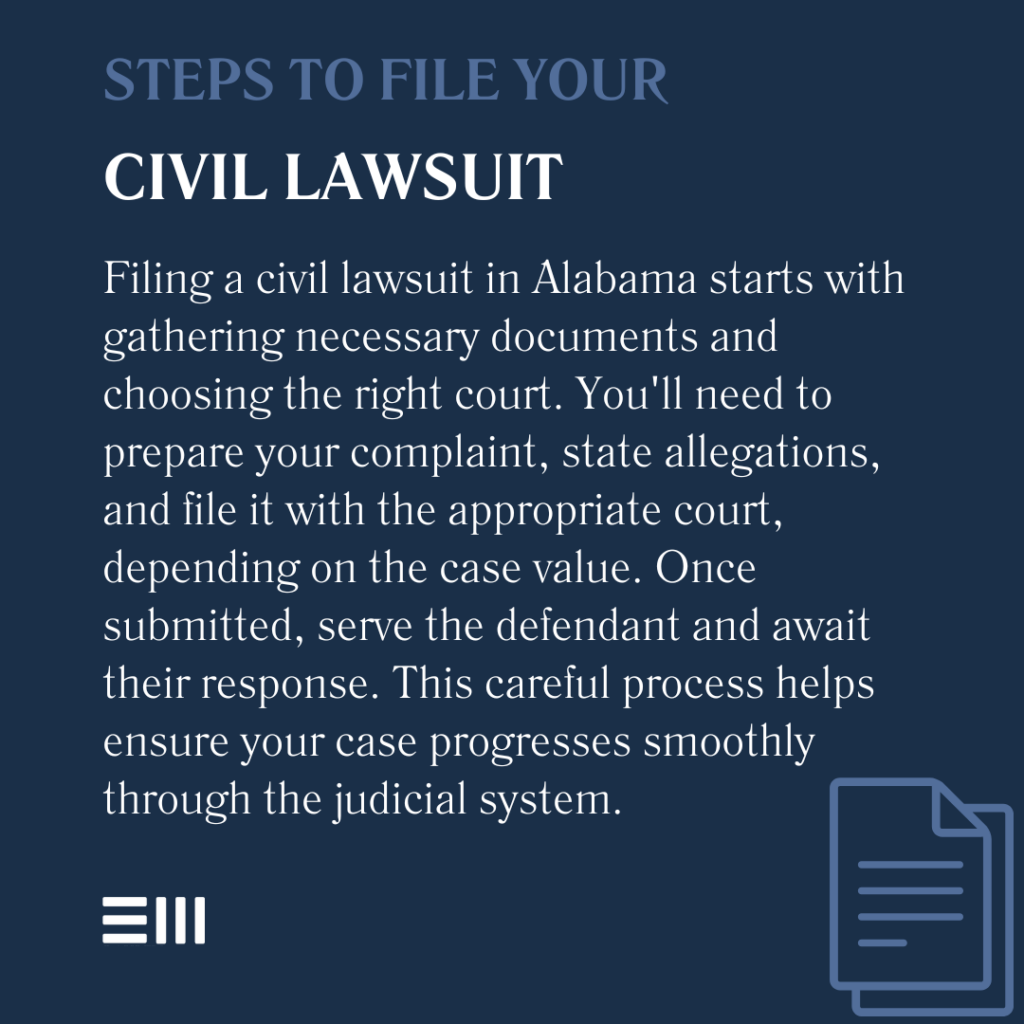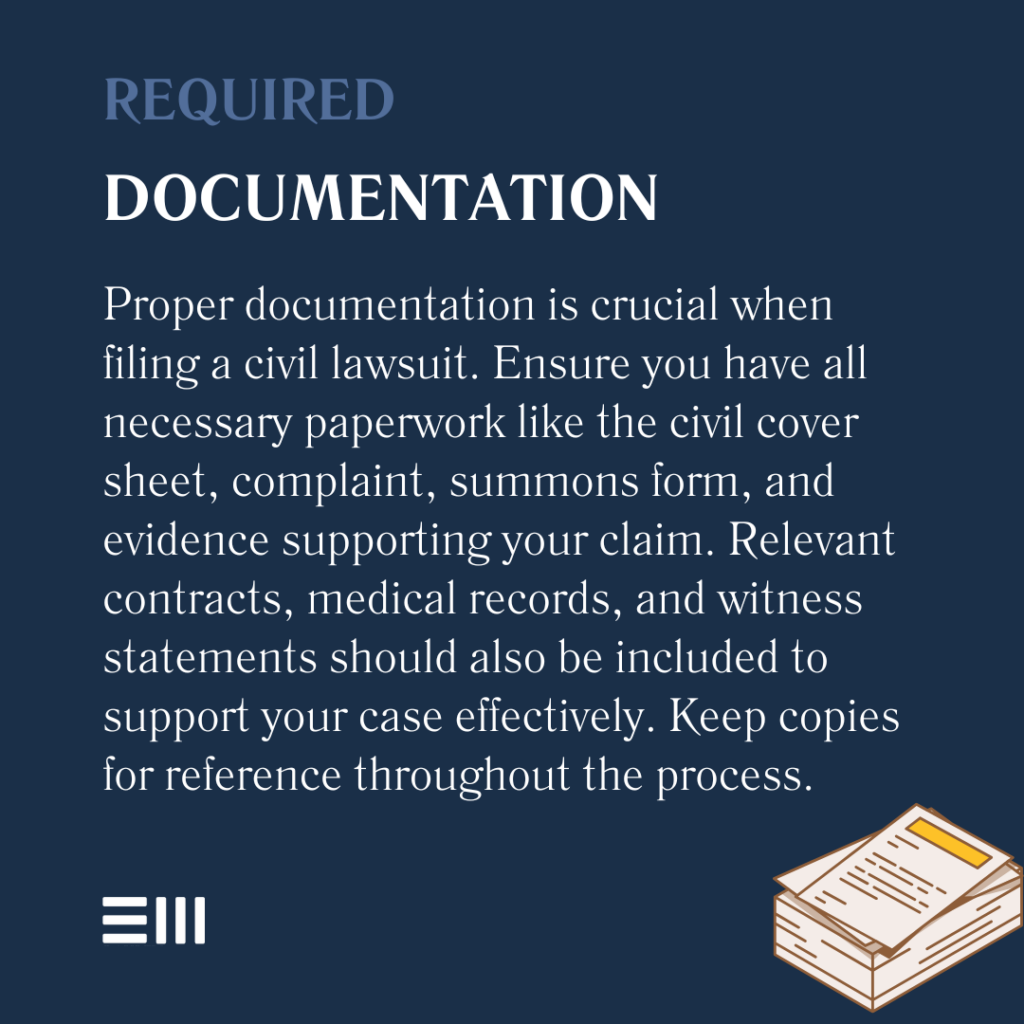
Civil lawsuits provide a formal way to resolve disputes between parties, from contract disagreements to property damage claims.
Alabama’s court system handles these cases through district courts, circuit courts, and small claims courts, each serving different case types and amounts in controversy.
Understanding which court handles your type of case marks your first step toward resolution.
These key elements shape your civil lawsuit journey:
- Statute of limitations ranging from 2-6 years, depending on case type.
- Filing fees starting at $256 for circuit court cases.
- Required documentation, including summons, complaint, and service forms.
- Various courts handling different case values and types.
- Mandatory mediation requirements in certain jurisdictions.
- Electronic filing options in select counties.
- Special procedures for emergency relief.
- Requirements for out-of-state defendants.
Every civil case requires careful preparation and attention to detail to navigate successfully through Alabama’s judicial system.
Your understanding of these elements helps build a stronger foundation for your case.
Steps to File Your Civil Lawsuit
Before diving into the filing process, gather all relevant documents, evidence, and information about your case.
A well-organized approach increases your chances of success and helps prevent costly delays or dismissals.
Follow these steps to file your civil lawsuit:
Determine the appropriate court:
- Small claims court for cases under $6,000.
- District court for cases between $6,000 and $20,000.
- Circuit court for cases over $20,000.
- Consider special jurisdiction requirements.
- Evaluate the complexity of your case.
Prepare your complaint:
- State your allegations clearly.
- Include specific damages sought.
- List all involved parties with correct information.
- Sign and date the document.
- Include supporting exhibits if necessary.
- Follow local court formatting requirements.
- Address jurisdiction and venue.
File with the court clerk:
- Submit original complaint plus copies.
- Pay required filing fees.
- Request summons forms.
- Obtain case number.
- File any emergency motions if needed.
- Request fee waiver if applicable.
- Comply with electronic filing requirements.
Serve the defendant:
- Choose certified mail, sheriff, or private process server.
- Ensure proper documentation of service.
- File proof of service with the court.
- Follow special rules for business entities.
- Handle out-of-state service properly.
- Meet timing requirements.
- Consider alternative service methods if needed.
Await the response:
- Defendant has 30 days to respond.
- Prepare for possible counterclaims.
- Consider motion practice.
- Plan discovery strategy.
- Evaluate settlement opportunities.
- Schedule case management conference.
- Begin gathering additional evidence.
Following these steps carefully helps ensure your lawsuit progresses smoothly through the system. Each step builds upon the previous one, creating a solid foundation for your case.

Required Documentation
Proper documentation forms the foundation of your civil lawsuit. Having all necessary paperwork ready before filing saves time and prevents delays.
Many cases face dismissal simply due to incomplete or incorrect documentation.
Essential documents include:
- Civil Cover Sheet;
- Original Complaint;
- Summons Form;
- Service Instructions;
- Evidence Supporting Your Claim;
- Proof of Identity;
- Any Relevant Contracts or Agreements;
- Witness Statements;
- Police Reports (if applicable);
- Insurance Documentation;
- Medical Records (for injury cases);
- Financial Records;
- Correspondence Between Parties;
- Photographs or Videos; and
- Expert Reports (if needed).
Keep copies of all submitted documents for your records and future reference throughout the case.
Organizing these materials in chronological order helps track your case’s progress and supports your arguments effectively.

Common Questions About Civil Lawsuits in Alabama
Understanding the intricacies of civil litigation helps you navigate the process more effectively.
Here are answers to frequently asked questions about filing civil lawsuits in Alabama.
How Much Does It Cost to File a Civil Lawsuit in Alabama?
Filing fees vary by court and case type. Circuit court cases start at $256, district court at $219, and small claims at $96.
Additional costs may include:
- Service fees ($45-100);
- Document preparation ($50-200);
- Expert witnesses ($500-5000);
- Deposition costs ($200-1000);
- Transcript fees ($100-500);
- Exhibit preparation ($50-300); and
- Mediation fees ($500-2000).
Understanding these potential costs helps you budget appropriately for your legal action and avoid unexpected financial surprises during the process.
How Long Do I Have to File My Lawsuit?
The statute of limitations depends on your case type:
- Personal injury: 2 years;
- Property damage: 6 years;
- Written contracts: 6 years;
- Verbal agreements: 6 years;
- Fraud: 2 years;
- Medical malpractice: 2 years;
- Product liability: 1 year; and
- Libel/slander: 2 years.
Missing these deadlines typically bars you from pursuing your claim, making it crucial to act promptly while preserving your legal rights.
What Happens After I File My Lawsuit?
After filing, the court issues a summons to the defendant. They have 30 days to respond.
The case then proceeds through:
- Initial response period;
- Discovery phase (3-12 months);
- Possible mediation;
- Pre-trial motions;
- Settlement negotiations;
- Trial preparation;
- Trial (if necessary);
- Post-trial motions; and
- Possible appeal.
This timeline provides a framework for understanding how your case might progress, though actual timing varies based on complexity and court schedules.
Do I Need a Lawyer to File a Civil Lawsuit in Alabama?
While not required for most civil cases, legal representation can significantly impact your case’s outcome.
Consider these factors:
- Case complexity;
- Amount in controversy;
- Your legal knowledge;
- Time availability;
- Opposition’s representation;
- Court procedures;
- Evidence rules; and
- Negotiation skills.
Professional legal guidance often proves invaluable, especially in cases involving complex legal issues or substantial monetary claims.
Where Should I File My Lawsuit?
File in the county where:
- The incident occurred;
- The defendant resides;
- The contract was executed;
- The business operates;
- The property is located;
- The injury happened; and
- The parties agreed to venue.
Choosing the correct venue ensures your case proceeds efficiently and avoids jurisdictional challenges that could delay resolution.
Take the Next Step With Your Civil Lawsuit
Ready to protect your rights and seek justice through Alabama’s civil court system?
Our experienced legal team understands the complexities of civil litigation and stands ready to guide you through every step of the process.
With decades of combined experience in Alabama courts, we’ve helped hundreds of clients successfully navigate their civil lawsuits.
Contact us today for a confidential consultation about your case. Our dedicated attorneys will:
- Evaluate your situation thoroughly;
- Explain your legal options clearly;
- Develop a strategic approach;
- Handle all court filings;
- Manage case deadlines;
- Negotiate on your behalf; and
- Protect your interests.
Don’t let the complexity of civil litigation stop you from pursuing justice. Reach out now to discuss your case with our knowledgeable legal team and take the first step toward resolving your legal matter.
Can't find what you're looking for? Search our site below.










